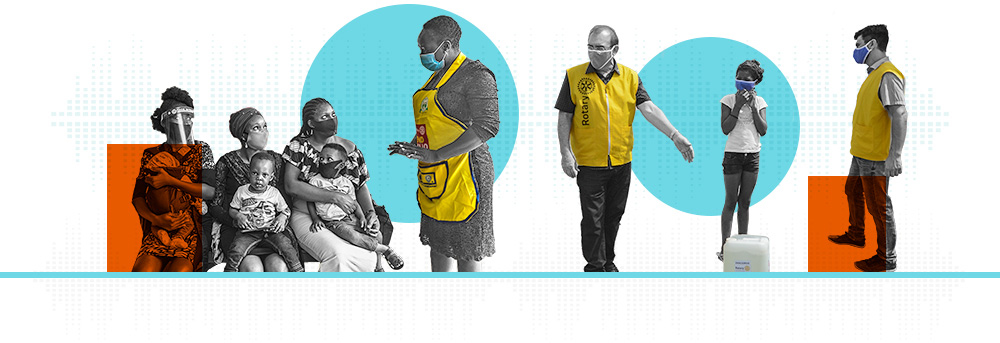
John Davis
After two years of working with the Future Vision pilot, we are certainly aware that change and sustainability are important concepts to Rotary International and The Rotary Foundation.
But some may ask: Why change a formula that on the surface appears to be producing results? Is it simply change for change sake? Most certainly not. As an organization, we are not attracting young adults in the numbers we would like. Is our organization too rigid and inflexible to attract these young professionals, who wish to make a difference in the world? If we are to reach them, we need to demonstrate that Rotary can make a visible difference in the lives of others.
Vocational training teams are designed to do just that. Using the vocational and professional skills of team members, particularly in countries where resources and infrastructure are limited, the teams improve the facilities and living conditions of the people living there.
As a Rotary district, we wanted to know what we could do to improve conditions in the Democratic Republic of Timor-Leste. The lifetime risk of maternal death at child birth is 1 in 30, and the percentage of deliveries with a skilled birth attendant is less than 30 percent. The first step was to send an investigatory group to the country, partly funded by a Future Vision district grant. With the information from that visit, Districts 9800 and 9550 submitted an application for a global grant to fund five vocational training teams over a three-year period, with the focus on maternal and child health. The teams will provide refresher courses for midwives working in Timor.
Two training teams have now been sent, the first in November 2011 and the second in May 2012. The third team will leave this month. The teams are working under the endorsement of the Departments of Health of the Timor government and the United Nations Population Fund, and the refresher courses are closely aligned with the United Nation’s emergency obstetric care program.
The global grant will also provide much needed basic medical equipment. This surely is how Rotary can meet the challenges of a changing world, and be a force for good in its second century of service.
Learn more about the Future Vision grant model.

Pingback: Seeking new horizons | Warsaw Rotary , Club 3393, District 6540
Dear John and all the others who commented
We live in the times of IT and we can attract young professionals to Rotary if we give them the opportunity to do it from their computer. The E-CLUBS and there are a number of them since the Col approved them , is the way to go forward. I am a member of the Rotary E-Club of South Africa D 9270 and am enjoying being envolved in projects, ever so often F2F meetings and being able to contribute to the Club via e-mail or connecting on our website. To be honest after changing from a conventional Rotary Club to the E-Club I have spent more productive time on getting projects going from my computer than I ever did before. The advantage of being a member of an E-Club: 24/7 in your own time you can work Rotary business, you don’t need to leave your family alone at home while you attend an evening meeting – in some countries this is a serious concern -,and with face book to complement your club’s website you are in touch. Changes in Rotary, we don’t need to change what we stand for, we just have to change how we apply it and think out of the box
LikeLike
E Club is a major way forward -not the only way. At the formative stage (Club Extension) a number of experienced Rotarians from standard Clubs should share experience and enthusiasm of common Rotary Programmes ,so that when the E Club is formed and functional, members know what to look for in Fellowship and Service -service alone may not be enough to retain members’ interest.
Ideally a E Club should have a few honorary members or previous traditional club Rotarians as members, to maintain a right balance in Club’s perspectives. E Clubs could also invite as speakers ,members from their District Committees as speakers ,so that Clubs are aware of their District and of course Rotary International.
Finally, standard Club members should also visit E-Clubs not only for make ups ,but also to have a first hand knowledge of E Clubs
I enjoy occasional visits to E Clubs. or even speaking at E-Clubs.
Rtn Dr. Himansu Basu
PDG RI District 1120
LikeLike
EGD John, very Good project, I think the ROtarian must be take aun Speciall mean for seducción the young profesional integrated ou organization
Best Regards
And Sorry for my English
GDE JOrge Vega D.
District 4320 2013-2014
LikeLike
Pingback: Seeking new horizons | Rotary Voices | Charlotte for Haiti Rotary Club
Problem … As an organization, we are not attracting young adults in the numbers we would like. Is our organization too rigid and inflexible to attract these young professionals, who wish to make a difference in the world?
Proposed Solution … Vocational training teams are designed to do just that.
Pilot … Two training teams have now been sent, the first in November 2011 and the second in May 2012. The third team will leave this month.
Desired Outcomes … did we solve the problem? And what did we learn from the first two training teams? How is the third different from the first two?
BTW. I believe major changes are needed if Rotary is to growth in stature and numbers.
LikeLike